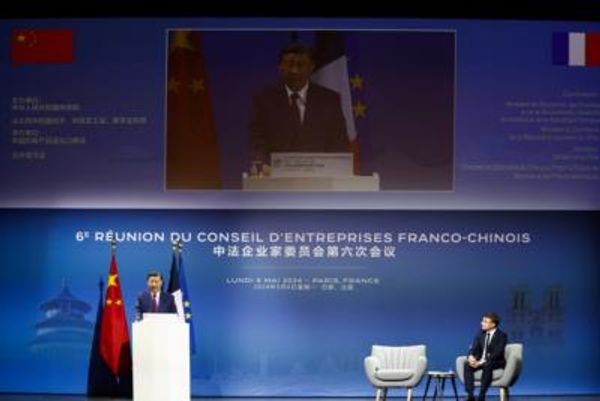Treasurer Jim Chalmers may have ruled out making changes to the stage 3 income tax cuts in his first budget, but there is a growing push for sweeping tax reform in this term of parliament.
The Commonwealth's deficit for last year came in around $47 billion better than expected when the Morrison government's last budget was handed down by then-treasurer Josh Frydenberg in March.
Thanks to surging inflation, along with jobs and commodity price booms, the deficit for 2021-22 ended up at $32 billion.
However, the economists at ANZ bank only expect things to get worse from there.
They are tipping a deficit of $35-40 billion for 2022-23 in Mr Chalmers's first budget as Treasurer, increasing to $55-60 billion the year after and hovering around $50 billion for at least the two years after that.
The government has talked about cutting non-essential spending to help rein-in those deficits but, as ANZ's forecasts highlight, most economists do not think that will be enough.
Teal independent MP for the wealthy inner-Sydney seat of Wentworth, Allegra Spender, who has a background in economics and business, agrees with them.
"I think probably spending cuts may not be enough to get it back into the black in a reasonable time frame," she told ABC News.
"I think we need to focus particularly also on productivity, and also on broader tax reform."
Ms Spender spoke at a recent revenue summit hosted by the Australia Institute at Parliament House in Canberra, and is speaking again later this week at a Tax Institute summit in Sydney.
She is calling for a comprehensive review, which would not only include income tax, but also revenue sources such as company tax, the GST, carbon pricing and resources taxation.
"You're seeing Australian companies, Australian families, being absolutely battered by the international prices, which are being driven by an international war," she said.
"And we're not getting the benefit from these resources. We need to be looking at that, both in the short term and the long term."
Ms Spender is also calling for an end to business fuel tax refunds that go mainly to the mining and agricultural industries.
"We spend about $11 billion a year on fossil fuel subsidies, including a fuel tax credit. I think this is an opportunity to reduce that," she added.
The independent MP is not the only person calling for an increase in resources taxation.
"Our natural resources, whether it's gas or iron ore, belong to everybody in Australia," Professor Robert Breunig, the director of ANU's Tax and Transfer Policy Institute, told The Business.
"We should be taxing that and sharing the revenue with everyone in Australia in the most efficient way possible."
His colleague, Kristen Sobeck, has done a lot of research on the flaws in Australia's Petroleum Resource Rent Tax (PRRT), which have seen it raise less than $32 billion so far this century, when the nation's LNG exports were worth around $70 billion last financial year alone.
Ms Sobeck's calculations show the PRRT collected last year will amount to around $2 billion.
Not all gas fields are covered by the PRRT, but tax experts also argue generous deductions for investment and the ability for companies to lower the gas price that they pay tax on compared to the global market prices they receive has annihilated the revenue raised from what is ostensibly a 40 per cent tax on profits.
A comparison with Norway's special tax on oil and gas companies, intended to raise their effective marginal corporate tax rate to 78 per cent, highlights the kind of extra revenue that might be raised.
The Norwegian government recently handed down a draft budget where it forecast raising a total of $1.38 trillion krone, or approximately $208 billion Australian dollars, in oil and gas revenues in 2023, up from $1.17 trillion ($176 billion) in the current year.
Australia's gas industry has required much more investment, for example to build the liquefaction terminals to export LNG, and many fields are subject to state royalties.
However, tax experts have said the gulf in revenue is still significant and largely explained by design flaws in the PRRT.
Ms Sobeck has also calculated how much revenue Australia has been missing out on due to the lack of a national mining tax.
In the case of the Gillard Labor government's Minerals Resource Rent Tax, abolished by the Abbott Coalition government a little more than two years after it was introduced, not a huge amount.
"It really didn't raise very much revenue because of the changes which were politically negotiated," she said.
However, the hole left by the failure of the Rudd Labor government's Resource Super Profits Tax (RSPT) to get off the ground is substantial.
"If the original RSPT had been introduced — a much more generous rent tax — it would have raised at least $12 billion per year," she said, noting that it could be much higher still given the recent surge in many commodity prices.
Tax tweak to slash the deficit
Then there are the stage 3 personal income tax cuts, which are already legislated, due to take effect in financial year 2024-25.
Those are expected to cost the budget close to $20 billion of lost revenue in the first year and $243 billion over less than a decade.
"We don't only have the loss of revenue over 10 years that's been costed by the Parliamentary Budget Office, we actually have a permanent flattening of our income tax structure," said tax expert Professor Miranda Stewart from Melbourne Law School.
"So that will permanently increase inequality."
The stage 3 tax cuts make three significant changes:
- Increase the income threshold for the top 45 per cent tax rate from $180,001 to $200,000;
- Abolish the current 37 per cent tax bracket for every dollar earned between $120,001 and $180,000;
- And lower the 32.5 per cent tax rate to 30 per cent, which would then apply on every taxable dollar earned between $45,001 and $200,000.
"The main benefit will go to people who are at the very top," explained Professor Stewart.
"They will get the full benefit of having a 30 per cent rate on the full range [of income] from $45,000 to $200,000.
She argued that a simple change would make the stage 3 tax cuts much more progressive.
"We've seen rates come down quite a bit over the last 15 years already. There's no reason for us to do that any further," observed Professor Stewart.
"I would reinstate that 37 per cent rate, or something like it, in the middle."
Economist Ben Phillips, an associate professor at ANU, said that would also provide a handy budget boost.
"Retaining the 37 cent rate will cut the deficit by about $7.5 billion in 2024-25, and cuts it by about $13-14 billion by 2032-33.
"And that cuts the size of the deficit down by about a quarter."
Combined with a resources tax that brought in at least $12 billion a year, the government would solve roughly half of its budget deficit problem with two tax changes.
However, Professor Breunig is not a supporter of repealing the stage 3 tax cuts, arguing that Australia already has the second highest percentage of tax raised through income taxes among developed economies.
He said that reduces work incentives while also failing to tax the biggest area of inequality — wealth.
"The personal income tax system really isn't up to the job of taxing wealth," he argued.
"We need to look at taxing other things, in particular taxing land, and then maybe thinking about how we treat trusts."
Multinationals the budget target
The one area the government has flagged it will tackle in its first budget is multinational tax avoidance and minimisation.
It took a range of "modest" measures to the election, including capping debt deductions for big corporates, that it estimated at the time would raise less than $2 billion over four years.
Some experts believe it could go harder to crack down on tax minimisation by global corporate giants.
"Within the companies, like CEOs and CFOs, or accountants and lawyers who are engaged to … help them to evade tax, they should be also held accountable, for example, jail," said associate professor Shumi Akhtar from the University of Sydney Business School.
Whatever the government ends up going in this budget, Professor Breunig is backing Ms Spender's call for a fresh review into the whole taxation system.
"Don't burn up the political capital on the stage 3 tax cuts," he argued.
"You went into the election saying you're going to follow through with them, just do what you said you were going to do.
"But now is the time to begin a national conversation about the bigger, wider problems with our tax system."
You can see more about this story on The Business, on ABC News Channel at 8:45pm AEDT.







